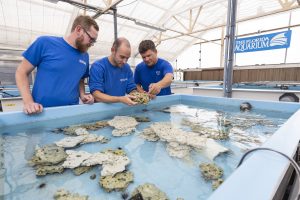Coral reefs serve as habitats for fish, increase tourism activities and reduce wave energy – among their many benefits.
That’s why scientists with the University of Florida and The Florida Aquarium’s Coral Conservation and Research Center collaborate to ensure coral reefs are healthy. To reach their goal, they bring most of their urchins and corals from the Florida Keys and spawn them at the center in Apollo Beach.

The collaboration between UF/IFAS and The Florida Aquarium began in 2012 to support important aquaculture research.
The Florida Aquarium wanted to develop a center to focus on conservation efforts, and the University of Florida Institute of Food and Agricultural Sciences (UF/IFAS) was brought in as a partner to provide scientific expertise and help address research questions related to coral reef restoration.
Urchins are critical to coral survival because the herbivores eat a lot of algae, which otherwise can smother the coral.
“Coral reefs are hugely important,” said Josh Patterson, a UF/IFAS associate professor of restoration aquaculture who works with the Aquarium’s biologists to run the urchin program. “Florida is the only U.S. state in the lower 48 that has coral reefs, and we actually have the third largest barrier reef system in the world.”
“It’s called a barrier reef because it creates a barrier between the open ocean and the valuable property in South Florida,” Patterson said. “It is also really important habitat for a lot of different species that we’re interested in.”
Some data from Ask IFAS detail the yearly importance of coral reefs across the globe:
- About 400 million people rely on fish from coral reefs as a source of protein.
- About 6 million people make a living by catching and selling coral reef fish.
- Tourism activities like SCUBA diving and snorkeling create revenue of $9.6 billion.
- People work in 70,000 jobs as a result of Florida’s Coral Reef.
Working together for a good cause
Both partners appreciate what the other brings to the collaborative relationship.
The Florida Aquarium’s Senior Biologist Matt Wade cares for the parent corals to support their reproduction, and Biologist Alex Petrosino does the same for the urchins. The Aquarium houses the urchins used in Patterson’s research and grows juvenile urchins so they can be released back onto Florida’s Coral Reef.
“Our partnership with the University of Florida is really great, because they bring the research side of things, and we bring the husbandry side of things,” Wade said. “So, we take care of the animals, making sure they’re healthy, so UF/IFAS can have living animals for their research. We make sure we keep good water quality, so the corals stay healthy. We also take care of the urchins. They’re great at cleaning algae for us.”
Biologists at the Aquarium make sure urchins eat a proper diet and that the broodstock (parents) are healthy enough that scientists can spawn them and start producing the baby urchins. They also produce thousands of juvenile corals annually to support rehabilitation and research efforts.

“By using sexual reproduction instead of asexual fragmentation – which is more common in coral restoration – we produce new genetic combinations that may be better suited to survive changing conditions,” said Wade.
Juvenile corals are very susceptible to the overgrowth of algae. A major focus of the collaborative research is on how young urchins produced by the UF/IFAS team can be utilized to improve the growth and survival of small corals in aquaculture at the Aquarium.
Research shows that using herbivores in co-culture with young corals helps the corals grow significantly faster, which translates into higher survival when planted back onto the reef.
“Adding urchin grazers to help corals produced by the Aquarium exemplifies our partnership perfectly,” said Patterson, a faculty member in the UF/IFAS School of Forest, Fisheries, and Geomatics Sciences and a Florida Sea Grant-affiliated researcher.
###
ABOUT UF/IFAS
The mission of the University of Florida Institute of Food and Agricultural Sciences (UF/IFAS) is to develop knowledge relevant to agricultural, human and natural resources and to make that knowledge available to sustain and enhance the quality of human life. With more than a dozen research facilities, 67 county Extension offices, and award-winning students and faculty in the UF College of Agricultural and Life Sciences, UF/IFAS brings science-based solutions to the state’s agricultural and natural resources industries, and all Florida residents.
ABOUT FLORIDA SEA GRANT
Florida Sea Grant is one of 34 Sea Grant programs supported by the National Oceanic and Atmospheric Administration (NOAA) in coastal and Great Lakes states that encourage the wise stewardship of our marine resources through research, education, outreach, and technology transfer. The program is hosted at the University of Florida Institute of Food and Agricultural Sciences (UF/IFAS). In addition to NOAA and UF/IFAS, the program is a partnership between Florida universities and county governments.
ABOUT THE FLORIDA AQUARIUM
The Florida Aquarium, a 501c (3) non-profit organization, is actively engaged in stewardship of the natural environment as a conservation-focused Aquarium with purpose-driven programs that include conservation, research, education and outreach. With a keen focus on delivering world-class experiences, The Florida Aquarium welcomes a million guests each year and promotes awareness and action on behalf of marine wildlife. Caring for a variety of aquatic and terrestrial animals and providing exceptional animal wellbeing is a hallmark of the Aquarium and through up-close encounters, underscores our interconnectedness with the ocean. Driven by a commitment to saving marine wildlife, The Florida Aquarium continues to be a global leader in ground-breaking research and rescue efforts that help restore Florida’s coral and sea turtle populations. For more information, visit FLaquarium.org and follow on X (Twitter), Instagram, Facebook, YouTube and LinkedIn.
 1
1
